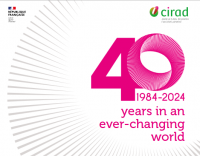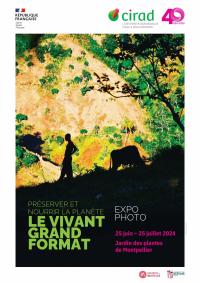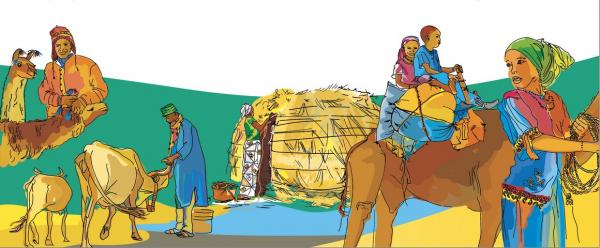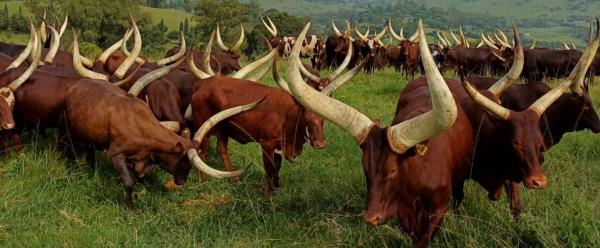As little as 30 years ago, agroecology was not a term commonly seen in CIRAD's annual reports. Since then, agroecological transitions have become one of the establishment's priority research topics, and guide its research projects towards guaranteeing more resilient farming systems. Similarly, One Health is now an inescapable part of efforts to build the food systems of tomorrow.
Agricultural research has seen many changes in four decades. From its original three main research disciplines (agronomy, forestry and livestock and veterinary science), CIRAD now encompasses more than forty. Its research orientations have changed, as have its methods, which are now more resolutely participatory and inclusive.
We are more convinced than ever that fair, strong partnerships are the only possible way forward.
Élisabeth Claverie de Saint Martin
CIRAD CEO
CIRAD has established numerous partnerships, giving it a unique stock of relations, knowledge and expertise. However, these often longstanding collaborations are continuously evolving to support innovation and progress in the field of agriculture. This approach goes hand-in-hand with a more engaged attitude on the part of research and the conversion of scientific results into public action.
While CIRAD primarily works in the tropics, the challenges facing farming systems are also global ones. From climate change and declining biodiversity to new health threats, agriculture has to move towards more sustainable production methods. This means new systems resting on rural communities, which must take account of their constraints and needs. CIRAD is even more necessary now than it was 40 years ago.
A brochure, a photographic exhibition and a season of podcasts
The anniversary has been an opportunity not just to look back at CIRAD's history but also to envisage the future and the possible pathways for tomorrow's farming systems. A brochure, "40 years in an ever-changing world", illustrates how the institution has evolved, through its major results, partnerships and new prospects.
> Read or download the pdf
"Preserving and feeding the planet: a large-format look at the living world" is a bilingual photographic exhibition offering a round-the-world picture of tropical farming systems. It is a brief look at CIRAD's research through large-format photos illustrating the vast range of scientific disciplines working together to improve food systems. The exhibition was inaugurated at the Botanical Gardens in Montpellier, before being shown overseas (Jakarta, Bangkok, Hanoi, Phnom Penh, Vientiane, Yaoundé, Belém, Brasilia, Fortaleza).
> Exhibition website
Season 5 of Nourrir le vivant, the CIRAD podcast, covered six major issues currently facing the global agricultural sector, looking back at the scientific and policy pathways that shaped yesterday's farming systems. This look in the rear-view mirror is intended to help design the farming systems of the future.
> All episodes (in French)
Events throughout the year, in France and elsewhere
CIRAD's 40 years of research in partnership have been celebrated throughout 2024 at its many regional offices. Those events have served to take stock of the main scientific advances and the challenges to be tackled in the coming years.
Find out more about some of the celebrations:
> CIRAD's 40th anniversary celebrations in Senegal
> CIRAD's 40th anniversary celebrations in Indonesia
> CIRAD's 40th anniversary celebrations in Brazil
In France, the anniversary was first celebrated in Montpellier in June, with our scientific partners based in Montpellier, partners from the global South, and private firms with which CIRAD works.
In November, the anniversary was celebrated in Paris, in partnership with the Le Monde newspaper, with a conference open to the general public and an institutional celebration with its line ministries and partners. The series of talks, workshops and discussions allowed participants to see how CIRAD has evolved over four decades, and to focus on a major issue for humankind: how to feed ten billion people by 2050 without destroying the planet, despite the many current crises.
Watch the replay
On 25 November, CIRAD celebrated its 40th anniversary with an afternoon of conferences on the topic 'Feeding the planet in 2050". We look back at the discussions, which highlighted the need for engaged research in partnership, and the emergence of bespoke solutions in response to the realities on the ground.
Partnerships with the media
A series of articles on The Conversation, launched to mark the anniversary, looked back over 40 years of science in partnership, highlighting several of the topics in which CIRAD has historically specialized: crop improvement, water and tropical forest management, and food security.
Read all the The Conversation articles signed or co-signed by CIRAD authors.
A video with Nangadef Productions, shown several times on the TV5 Monde channel, " Nouvelles d’Afrique ", brought the year to a close by showcasing the benefits of three CIRAD projects funded by the European Union and AFD.
A bit of history
CIRAD is the result of the merger, in 1984, of nine technical and research institutes centring on tropical value chains. In the space of a century, operations have gone from agricultural experimentation within a colonial economy, through providing technical support to newly independent countries, to today's research for development partnerships, against a backdrop of globalization and global change (climate change, demographic change, etc). This history has given CIRAD 80 years of experience in producing knowledge and technical solutions and supporting innovation in terms of crop and livestock farming and forestry in tropical countries .


























.jpg)






